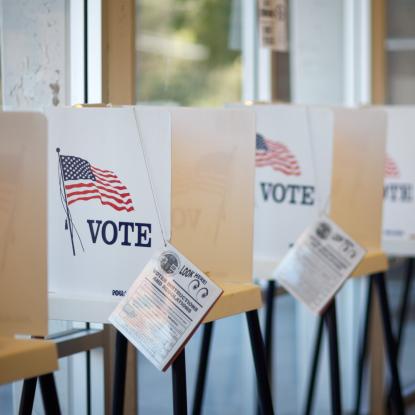


America is a democracy, but is that democracy accessible to every American? When the Constitution was ratified, only white men who owned property could vote, which was only 6% of the population. In the more than 200 years since then, many Americans are still being denied the right to have a say in key decisions that impact our lives.
In this episode Simone talks with Brittany Carter from the NAACP Legal Defense Fund about the history of voting rights, and how African Americans risked their lives and safety for the freedom to vote. Then, CLC lawyers Paul Smith and Danielle Lang explain what voting access looks like today, and what barriers still exist for many Americans including people with disabilities, people of color and those with felony convictions.
Host and Guests:
Simone Leeper litigates a wide range of redistricting-related cases at CLC, challenging gerrymanders and advocating for election systems that guarantee all voters an equal opportunity to influence our democracy. Prior to arriving at CLC, Simone was a law clerk in the office of Senator Ed Markey and at the Library of Congress, Office of General Counsel. She received her J.D. cum laude from Georgetown University Law Center in 2019 and a bachelor’s degree in political science from Columbia University in 2016.
Paul Smith has four decades of experience litigating a wide range of cases. He has argued before the U.S. Supreme Court 21 times and secured numerous victories, including Lawrence v. Texas, the landmark gay rights case. In addition, Paul has argued several voting rights cases at the Supreme Court, including Vieth v. Jubelirer and Gill v. Whitford, involving partisan gerrymandering, LULAC v. Perry, involving the legality of Texas’s mid-decade redrawing of congressional districts and Crawford v. Marion County Election Board, involving the constitutionality of a voter identification law. Paul previously served as a partner in the law firm of Jenner & Block, where he was chair of the firm's Appellate and Supreme Court Practice and co-chair of the firm's Election Law and Redistricting Practice.
Danielle Lang has worked as a civil rights litigator her entire career and now leads CLC's voting rights team dedicated to safeguarding the freedom to vote. She has led litigation against Texas's racially discriminatory voter ID law, Florida's modern-day poll tax for rights restoration, Arizona's burdensome registration requirements, North Dakota's voter ID law targeting Native communities, and numerous successful challenges to signature match policies for absentee ballots. Previously, Danielle served as a Skadden Fellow in the Employment Rights Project of Bet Tzedek Legal Services in Los Angeles, where she represented low-wage immigrant workers in wage and hour, discrimination, and human trafficking matters. From 2012 to 2013, Danielle clerked for Judge Richard A. Paez on the U.S. Court of Appeals for the Ninth Circuit.
Brittany Carter is the Political Participation Fellow at LDF, focusing on voting rights litigation and voter protection efforts. She is a member of the legal team litigating Milligan v. Merrill, a high-profile case which was argued before the Supreme Court of the United States, charging that the congressional redistricting map drawn by the Alabama legislature denied Black residents equal opportunity to participate in the political process and elect candidates of choice. Prior to LDF, Brittany served as a law clerk to the Honorable Sam A. Lindsay of the U.S. District Court for the Northern District of Texas.
Links:
Voting Must Be Accessible (Campaign Legal Center)
To Make Elections Accessible, Modernize Voter Registration (Campaign Legal Center)
About CLC
Democracy Decoded is a production of Campaign Legal Center, a nonpartisan nonprofit organization which advances democracy through law at the federal, state and local levels, fighting for every American’s right to responsive government and a fair opportunity to participate in and affect the democratic process. Learn more about us.
